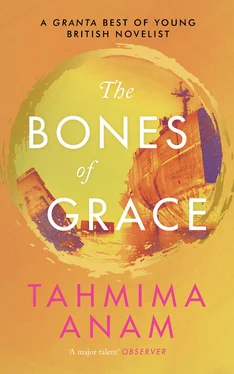I lay flat on my back, and he put his warm palm on my spine and ran me around and around the pool. We did this for what felt like hours. Later that year, when my parents bought an apartment on the other side of town and I struggled to make friends at the new school, Rashid took me under his wing, not embarrassed to be seen with me in the morning before the bell rang, waving to me from where he stood in front of the wicket, handsome beyond belief in his cricket whites, and when he ran the ball up and down his leg and made pink streaks on his uniform, I thought I would suffocate under the weight of my crush, but I didn’t, I just kept feeling his hand under me, his steady presence, teaching me to swim, to belong, to fit in. I don’t tell you this story to hurt you, Elijah, but to explain that the idea of leaving Rashid was like the idea of leaving behind my childhood, and, because I was a person whose life began with her own life, and not, like you, with a family tree that stretched back generations, I clung to every piece of my past, unable to forget, or let go, of a single thing, and maybe if Zamzam hadn’t been arrested and we had managed to get Diana out of the ground, I would have been able to move through this moment with greater confidence, the confidence to break old threads and strengthen new ones, but now, in the shadow of this spectacular failure, I became, again, an obedient orphan.
Rashid was all over me, kissing my face and my neck. ‘I can’t believe you’re home,’ he said. I leaned my head against him for a moment, but it was not as I had imagined.
I had, a few minutes earlier, received this from you: Ne me quitte pas .
‘Oh, jaanu, don’t be mad. I can’t be happy to see you? What’s the matter?’
‘It’s nothing.’ I looked down at my hands. I didn’t know how to put it, I didn’t even know what I wanted, so I said, again, nothing, and then it was too late: Rashid was rolling down the sleeves of his shirt and buttoning the cuffs, as if he had at some point decided to punch me and then changed his mind. Then he said, ‘Let’s go to Sally and Nadeem’s. You’ll feel much better after a drink.’
Nadeem passed me a gin and tonic and said, ‘What’s new with you, sister?’ and I replied, ‘I’m all fucked up,’ and Nadeem laughed, raking a skeletal hand through his hair. In high school he’d been Rashid’s best friend, but Rashid had left for university in London while Nadeem had stayed behind to join his father’s business. In the summer holidays we would come home to find him perpetually stoned, playing video games or chasing his Pointer around the back garden. There was a quick downward spiral, and a year spent in rehab, and then, much to everyone’s surprise, Sally agreed to marry him, and they moved into a flat and became ordinary.
‘You’re a strange girl,’ Nadeem said to me, tilting his whisky in my direction.
Sally passed around a plate of Bombay mix. ‘So you back for good this time?’ she asked.
Rashid cupped my knee. ‘I’m not letting this girl out of my sight.’
‘When’s the wedding?’
I wanted to lunge at her for bringing it up. ‘Everyone wants to know,’ I said. I noticed a streak of pale hair across her forehead and changed the subject. ‘Did you dye your hair?’
‘My cook did it. She’s a genius.’
The gin and tonic was making me woozy. I felt a surge of revulsion for Sally and realised I had spent my whole life with these people, and I thought again about Zamzam, and Diana, and you, Elijah. Were you thinking of me? What would you make of this apartment, the leather dining chairs, the white baby grand against the sliding doors, Gulshan Lake glittering in the background? My tongue was sweet and heavy in my mouth. I relaxed, allowing the memory of our days in Cambridge to float around in my mind. ‘It’s a bit radical,’ I said, going back to Sally’s hair.
‘Well,’ she announced, ‘I’m fucking pregnant.’
‘Shit!’ Rashid said, slapping Nadeem’s shoulder. ‘Come here, man. Let me hug you.’
I tried to think of something nice to say. ‘Congratulations,’ I managed.
‘You’ll be next,’ Nadeem said.
I would be next. I considered Dhaka, this neighbourhood with big houses behind high gates, this over-air-conditioned apartment, and I was overcome with affection. A part of me was still back on Trowbridge Street, or eating ice cream with the Atlantic summer at my back, talking about jazz and Shostakovich and breakfast sandwiches with you, or out in Dera Bugti with a chisel in my hand. But I was at ease for the first time in months, at ease standing on what I knew instead of the strata of meaning I was capable of imposing on every situation. With these people who had known me all my life and not at all, I didn’t have to talk about Zamzam, or the expedition, what I was going to do with my life, who I was going to become or who I had been.
Sally said she wasn’t going to give up drinking, though she sent Nadeem and Rashid to the balcony to smoke. ‘I’m terrified,’ she said to me when we were alone. ‘My vagina’s going to be the size of a drainpipe, and even my tits will go back to being tiny in the end. What’s the point?’
Sally, whose nickname came from her last name, Salehuddin, had always had a habit of making things sound worse than they actually were; in reality she was an optimist, insisting to her parents that Nadeem would someday grow up and become a good husband. I had attended their wedding, Sally buried under a thick layer of foundation, her parents hovering behind the wedding dais with fixed smiles on their lips.
‘It won’t be so bad. I hear they can be pretty cute.’
‘When they’re not crying all night and vomiting in your face.’
‘So why are you doing it?’
‘Not everybody’s like you.’ I knew what Sally meant, but I let her finish. ‘Perfect boy, everything you could possibly want. This baby means Nadeem stays out of trouble, at least for a few years.’
‘Then what?’
‘I’ll pop out another one.’
‘That’s your grand plan?’
‘I didn’t go to Harvard. It’s the best I could do.’
No one would let me forget I’d gone to Harvard.
Over whisky-laced coffees, we listened to Nadeem strum his guitar. ‘You’re different,’ Sally murmured to me, her chin on my shoulder. Not as different as I could be, I thought. But I said: ‘I’ll be back to my old self in no time.’
I did not return to my old self. Every morning I woke up with a jolt and realised I was no longer in Dera Bugti. This reminded me of what it meant for me to be here, safe, in the arms of people who loved me, that the price for this safety was the life of another man. I was longing for more than the few cryptic messages we occasionally exchanged, but I was so diminished that I was convinced you would find me dull and unworthy of your notice, and anyway, I had still not found the words to describe what had happened, not even to you.
When I wasn’t obsessively Googling ‘whale prehistoric arrest Zamzam Baloch disappeared’, I was lying about the apartment and not answering Rashid’s phone calls. He sent me messages asking if he could come to the apartment, but I never replied and he stayed away, though I imagined him bumping into me when I took long, pathetic walks around Tank Park or pushed a shopping cart under the blue lights at Unimart. I was very hungry and frequently on the verge of tears. My father knocked on my door every morning and asked if I would have breakfast with him. I almost always said no.
My mother was distracted by a new job. I was thankful for this, because I knew that if she turned her attention to me I would be forced to put words to what was happening. In Bangla they refer to women like my mother as dhani morich, because the tiniest chillies are the hottest. My mother is tiny and terrifying. During the war, she drove her ambulance every day to Salt Lake, the refugee camp on the outskirts of Calcutta, where all the exiles were stacked into unused sewer pipes. She gave them vaccines and bandaged their wounds and held their hands as they lost their children to cholera. I believe her whole personality was built in that moment — only seventeen and having to look death straight in the eye — but she must have always been that way. My grandmother paints a picture of a girl who was more stubborn than a trapped fishbone, a girl who tried to cut down the guava tree in the backyard because it had given her a scratch the last time she had tried to climb it. But the war was fundamental, a kind of birth not just for the country but for all the too-young people who had willed the country into being.
Читать дальше












